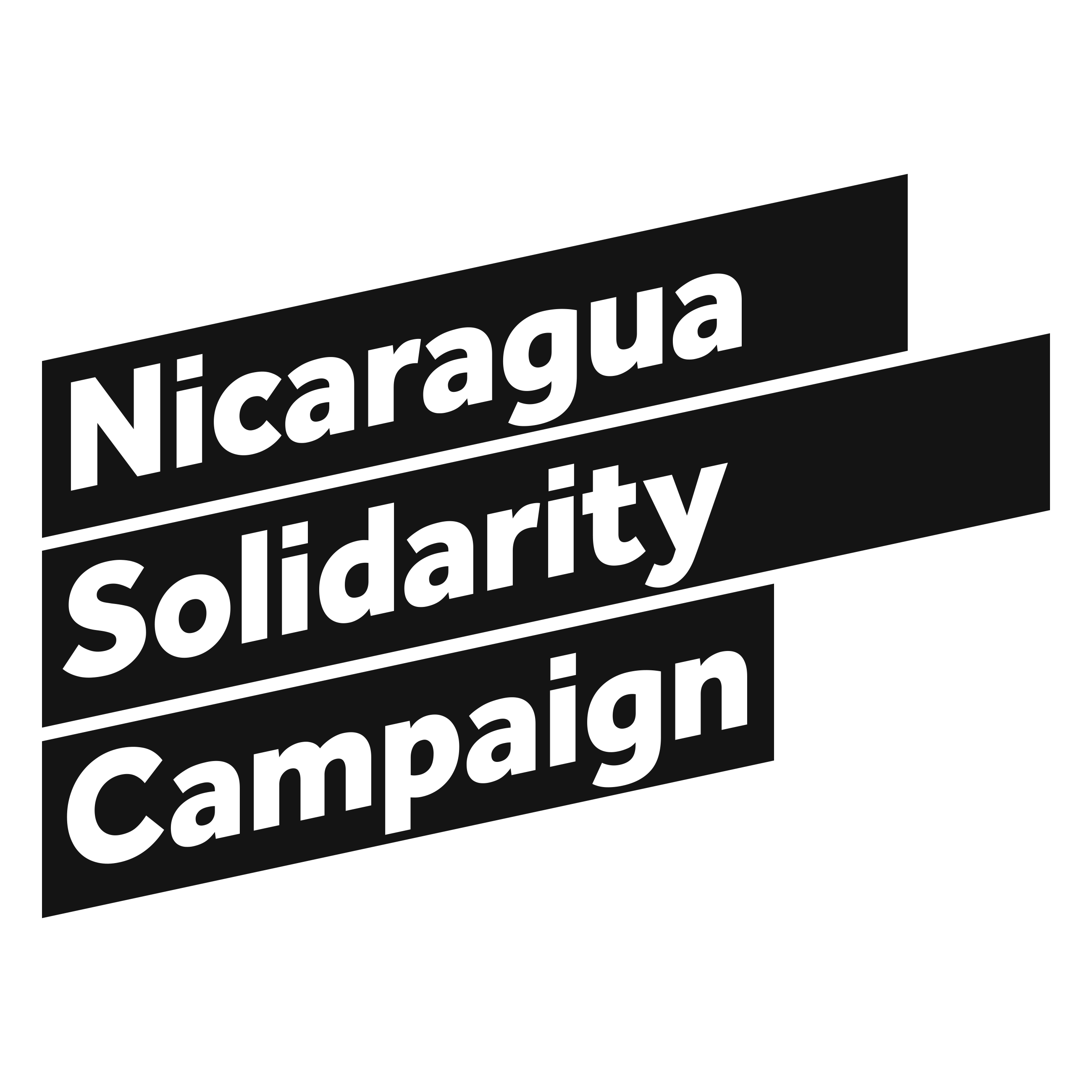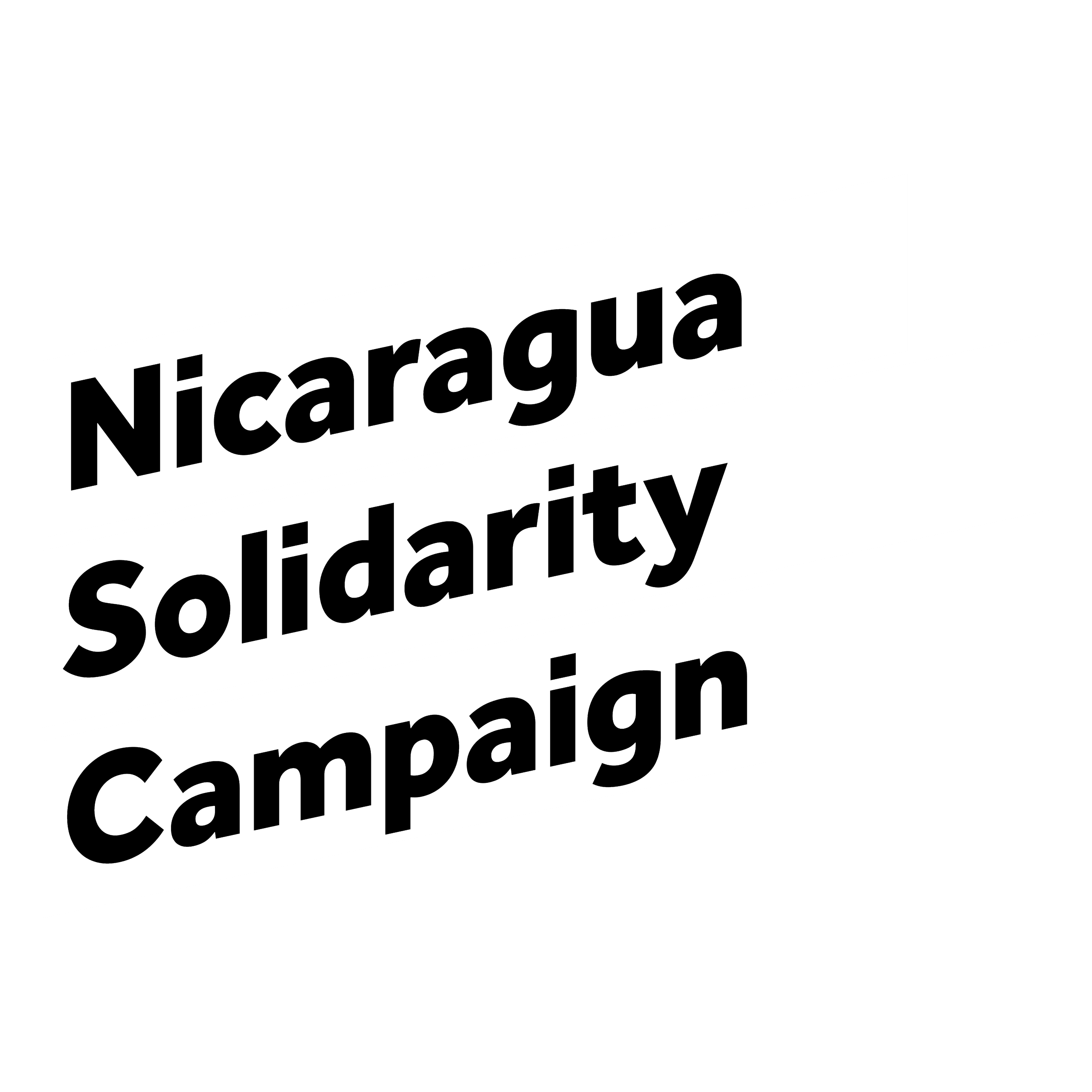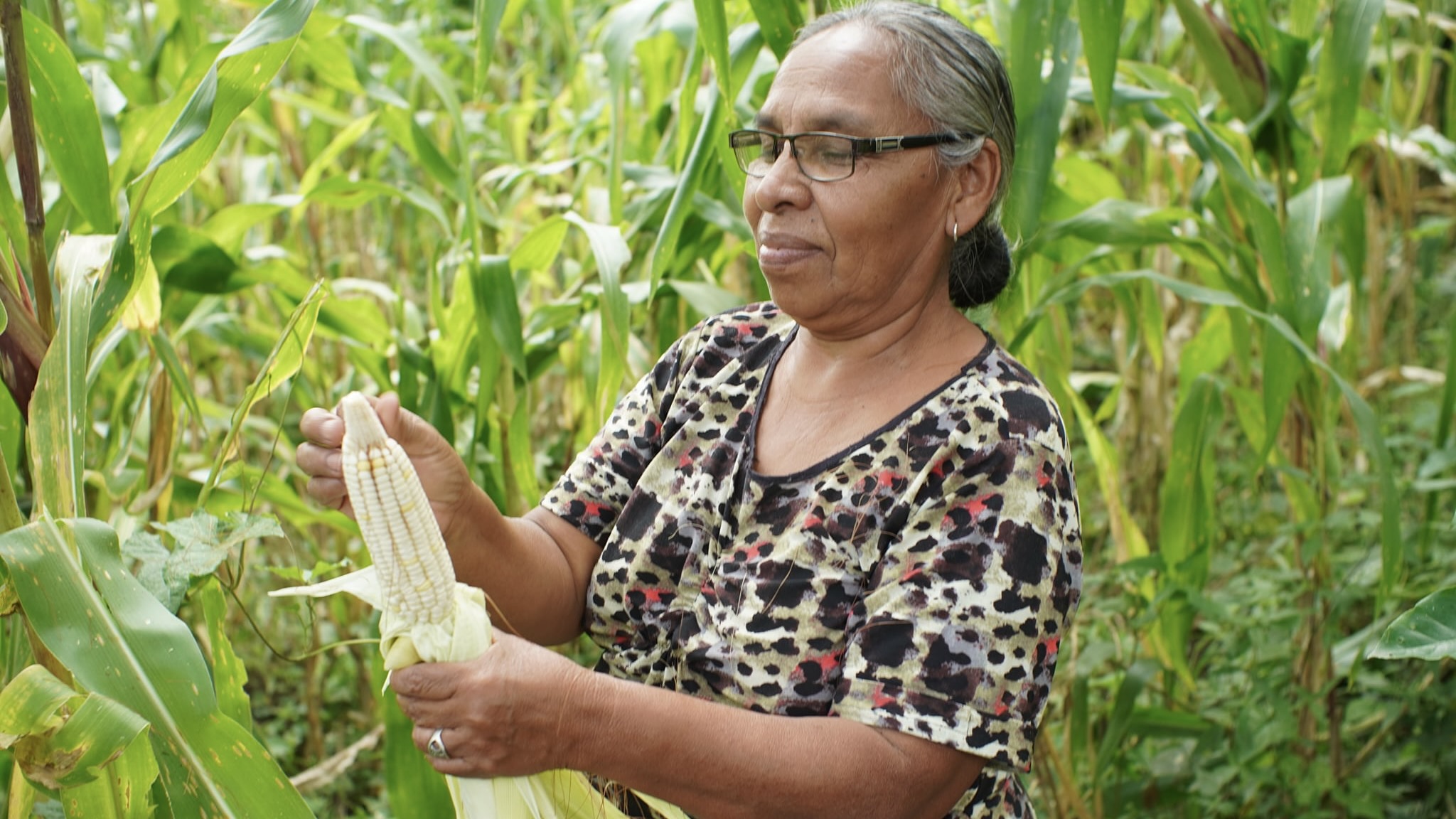
Peasant feminism: changing relationships between people and the environment
Since its inception in 1993, La Via Campesina (LVC), a global movement of small-scale farmers and indigenous peoples, has been developing and putting into practice peasant feminism that is rooted in the life experiences of rural women and recognises that all life forms are interconnected.
Small scale farmers and workers in rural areas have traditionally faced multiple interconnected forms of exploitation, exclusion, poverty, displacement, and invisibility.
All these forms of violence, that have particularly impacted women, have been exacerbated by the systemic violence of neoliberalism: the concentration of land ownership and resources in the hands of the corporations, the unsustainable exploitation of people and the environment.
‘Transnational agribusinesses have turned food production and consumption into one of the greatest health hazards for people and the planet.’ Action Group on Erosion, technology and concentration (ETC group)
Peasant feminism fully recognises the overlap with other forms of more urban based feminism such as the struggle for gender equality and the elimination of all forms of gender based violence. But it also encompasses food sovereignty, access to land, the protection of biodiversity, reclaiming ancestral practices, and building new relationships among human beings. It is also crucial in transforming patriarchal, capitalist social and economic structures.
‘We must learn from the climate crisis and pandemic and invest in building local, resilient, and diverse food systems. ‘LVC
Further information: https://viacampesina.org/en/who-are-we/women/
—————————————————————
Peasant feminism: the Nicaragua example
‘In 45 years of the organisation of the ATC (Rural Workers’ Association) and the Revolution, the ills of illiteracy have been left behind, extreme poverty and poverty have been reduced, the right to land and agroecology has been vindicated, and peasant production has been dignified.’ Statement on the celebration of the ATC’s 45th anniversary, 2023
♦ The ATC, one of the founding members of the LVC, works with its 47,000 members and in the defence of employment rights of rural workers and in strengthening the struggles for political, economic, social and climate justice in rural areas.
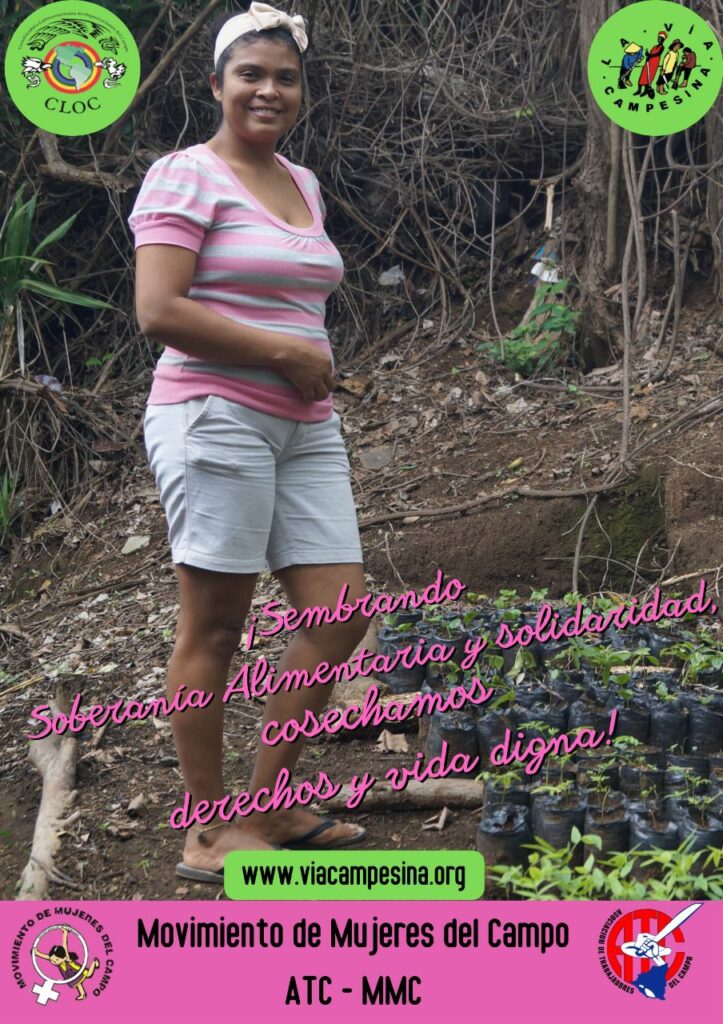
Since the early 1980s, the ATC women’s movement MMC has represented the interests of rural women.
♦ The ATC has four training centres where they run courses for both women and men that include gender relations and eliminating gender based violence. These programmes also foster women’s leadership in rural movements: in the ATC itself the majority of both national and departmental leaders are women.
♦ One of these centres, the Latin America Agroecology Institute Ixim Ulew (IALA), offers agroecology, food sovereignty and political organising training for students from LVC organisations from across Central America and the Caribbean. Part of this training focuses on dismantling patriarchal structures and transformation to a model that builds shared responsibilities between women and men, and boosts food production that protects people and the planet.
‘The task we have is to recover the land and our identity as young campesinxs, to have our own land to grow food in a holistic, diversified way.’ IALA graduate Migdalia Cruz, ATC Jinotega
♦ The ATC works directly with peasant communities organised into co-operatives and associations accompanying their work, providing technical training and facilitating their links with government training programmes.
♦ Unlike almost all other countries, the ATC and its members function within the context of a government that has put in place measures responding to rural needs, particularly of those of rural women. These include agrarian reform and land titles, technical training and marketing, rural roads and electrification, and free health care and education. Zero hunger and low interest credit programmes, rural health centres and mobile clinics particularly impact the lives of rural women.
—————————————————————————————————
Peasant feminism in practice: the Fundacion Entre Mujeres (FEM), Esteli
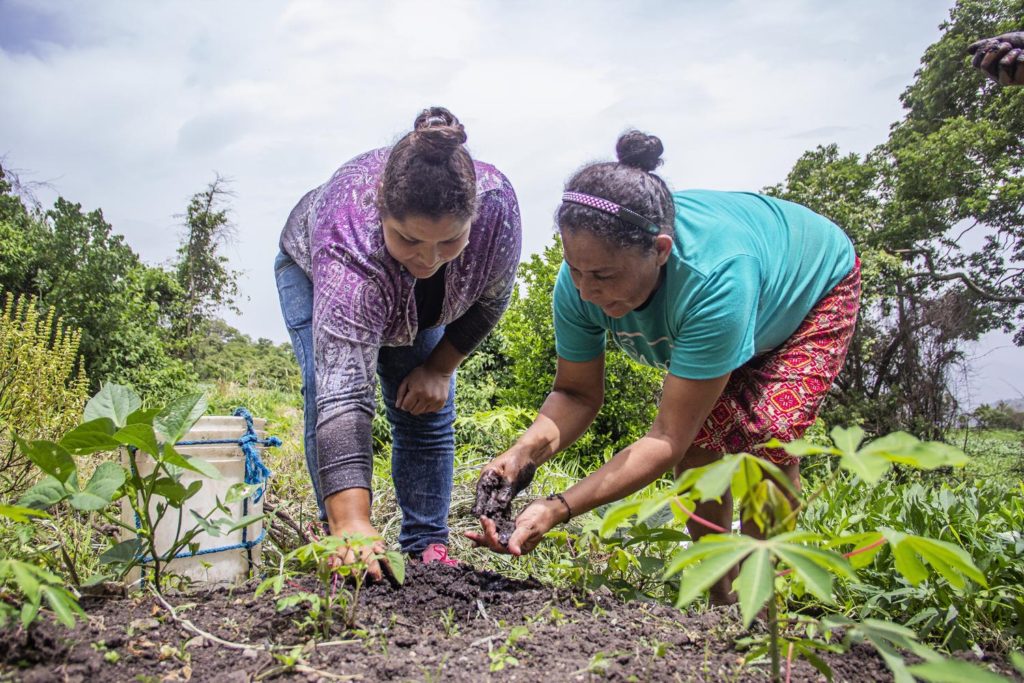
FEM is an organisation of 3,000 peasant women living in 17 communities in the department of Esteli working together to improve their lives and those of their families and communities.
In an online event about women in rural areas, *FEM representative Cristian Guzman described how her campesina grandmother is one of the strongest influences in her life. Cristian sees herself building on the legacy and wisdom of struggles of generations of rural women epitomised by her grandmother’s example.
For FEM one key priority is eliminating stereotypes such as those of perceptions that people from rural areas are backward and uneducated. Overcoming such perceptions is key to recovering the identity of the countryside and those who live there as something positive.
This is essential to encouraging people to identify with the countryside as a place to stay and enjoy based on collective effort and community values thereby counteracting the mindset that leads to a flight to cities or elsewhere. For the FEM, the first step in building peasant feminism is raising awareness and consciousness and political education on the roots of inequality, class, and gender.
For FEM the first step in building peasant feminism is raising awareness and consciousness through political education on the roots of inequality related to class and gender.
Cristian went on to explain the importance of recognising that women in rural and urban areas have been impacted differently by colonialism. For all women, the common issues are the struggle for gender equality and against gender related violence.
But for peasant feminists the struggle is also about their relationship with the environment: seeds, land, water, food, life in all its forms. For example, setting up our own seed banks fundamental, ‘if we lose control of seeds, we lose control of life itself.’
FEM’s areas of work:
♦ Agroecology: Eight women’s agroecology co-operatives ensure healthy food for their families and communities and to sell locally. These include maize and beans, eggs, chicken, pork, dairy, fruit, vegetables, herbs, coffee, and honey, tea, jelly, and hibiscus wine. FEM farmers use no pesticides, chemical fertilisers, or seeds. This is all part of taking a long term perspective on the health of the land and food, sustainable farming practices that minimise green house gases and help to cool the planet.
♦ Banks of carefully selected resilient seeds are made available to FEM members with a special communal reserve for climate crisis related disasters such as hurricanes and droughts. ‘Sovereignty over our bodies, our rights, and our seeds is one of FEM’s slogans
♦ Training workshops, forums, networking, and campaigns on topics such as the struggle against violence; rural issues from a generational and gender perspective; building awareness of land and housing rights for women; and forming a network of young women. Credit funds to enable women to access land and technical support for sustainable agriculture.
♦ Influencing local and national politics through meetings with officials to demand the fulfilment of women’s rights, and public promotion of FEM’s perspective as peasant feminists.
♦ Networks of agroecology promoters and communicators include a mobile health clinic and a youth radio programme that educates the public in setting up rural and urban backyard gardens.
♦ A men’s group called Miyotl organises workshops on new masculinities. Faced with ridicule in a machista society, a member of the group responded, “I am not gay, but I have learned that I can be friends with men and even love them.” When asked whether gay men would be accepted into the group, he answered, “Why wouldn’t they be? We practice agroecology and embrace biological diversity. Why would we not embrace diversity among human beings?”
————————————————————————————————
* Cristian Guzman spoke at a session of a course organised by Friends of the ATC as part of the annual Ben Linder Solidarity School, in a special collaboration with the Women in Nicaragua: Power & Protagonism series organised by Alliance for Global Justice and Casa Ben Linder.
